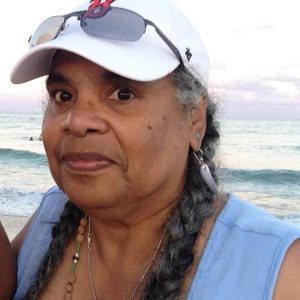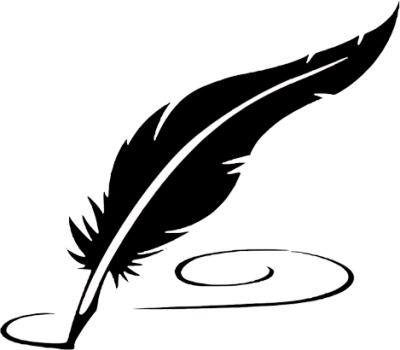Cecelia Estrada Vaughan/iti kafi
The Lady who lived next to the Railroad Tracks
When ipok, granddaughter, and her parents left home to visit the Lady, Mama cuddled her little girl tight and kissed her four times. The little girl wore her Simplicity Pattern jumper dress made by her mother, laced white high-top shoes, and a little brown plaid jacket. Mama always fixed her hair in two long braids intertwined with red ribbons. Her father would turn on the radio while they drove to the old house next to the railroad tracks.
Daddy always took her hand to walk together to the front door. While they waited at the door, she would look back at ishki, Mama, sitting alone in the front seat of their car. Her mama never went inside with them; always smiled raising her hand, as if she were placing it on a glass window. The front door opened, and she, ipok tek, granddaughter and her father would step inside.
The Lady never glanced outside beyond the door. Inside, she would help ipok tek remove the little brown plaid jacket, then hand it to her son. Within the old house were unusual things she was not supposed to touch, traditional things such as old plaited baskets and blankets, beautiful blown glass objects nestled in starched white doilies on tables. The old wooden cabinet was where the Lady kept the clay pottery. Family photographs in antique wooden frames surrounded a kerosene lamp on a small table.
At each visit, the Lady pointed out to her ipok tek the photograph of her daddy when he was a vllanakni, small boy; and the photograph on the wall of Daddy’s father with older men standing in a field near a fence with horses. A group of children with brown faces and long black hair stood under a shade tree, looking towards the camera.
The Lady’s kitchen smelled familiar, like Mama’s house. This made her think of ishki, sitting alone, outside in the car. The ipok would trot to the window to look towards the car. Her mama sat silhouetted with a bowed head. Father would call to her to take her place at the table.
Walking back into the kitchen, she would hear the train whistle. How did the train always know when she was going to eat lunch?
The noon meal meant Daddy and the Lady would use the words she did not hear very often. When she remained quiet, she remembered many of the words they used. Mama taught her words when they took walks together at home. The Sun is called hvshi, and corn is tanchi, oka is water, and a seed is nihi. The ipok wondered, if the reason Mama always stayed inside the car was because the Lady and Mama talked in different words?
After eating the beans, grits, and tomatoes, the Lady took her grandchild outside to sit in the back yard. The area behind the house was a nice yard with a water pump, a long wooden table and benches; edged with a variety of sunflowers, black-eye susans, all-season lilies, wandering morning glories, watermelon, and squash vines. In a very sunny corner of the Lady’s yard was her garden of corn peppers beans cucumbers and tomatoes.
Daddy always stayed indoors smoking cigarettes washing the dishes. The Lady would sit on the top porch step and smoke her pipe, watching. Ipok tek sometimes felt the Lady’s hand touch the back of her head or her shoulders but she never invited the grandchild to sit in her lap. The daughter would sometimes catch her iki, father looking at his mother from behind the window curtain; smile at him because he looked sad. Daughter would always want father to come join them outside.
It was the connection she needed like seeing the brown faces of the children in the photograph. He smiled when the Lady snuffed her pipe, stood up to take her grandchild back to her son. The table cleared, the dished washed and put away was if they had not shared a bimonthly meal together. Daddy always took leftover food home in a small brown paper bag. It was time to leave.
The Lady helped ipok tek with her little brown plaid jacket, and then gave her two small oranges, hugged her son kissed and pinched his cheeks. The grandchild looked up and smiled at the Lady, stating in a small voice yakoke, thank you. Yakoke was the word to say when someone offered you something. The Lady did not hear her ipok, and didn’t know to smile. Her daddy always smiled when she said “thank you.”
From the front porch door, she could see Mama, and ran to the car. She waited for daddy to open the door, quickly glancing back to watch the Lady close the door of the old house. Sitting together in the front seat, mother asked daughter if she had a nice time with the Lady.
The grandchild held up the small oranges, “I said yakoke, daddy!” then invited herself to nest in her mother’s lap. Father looked at both of them smiling, patting his vllatek ossi, little girl at the nape of the neck.
Looking up at Mama’s lusbi, dark brown face, the daughter moved her small hand to touch the face of love, kindness, courage, and hurt. Mama put aside the embroidery hoop she had been working on the entire time while her husband and daughter were inside that old house, and tightly held her ushetik, daughter to kiss her four times.
Names Not Given: for “Bess”
I.
Today we know
a trail of tears began
long before what we hear is written
Tears numerous as stars above
some shine brighter
over stolen land
As if seeing a perfect seashell
washed ashore would stop one
from looking further to find
evidence of more, some
may never see an ancestor’s name seeking
to reach the end of the beginning.
Have a longing to know beyond ink smears
and misspellings in old papers
Sweet “Bess”
Someone found your name and told
the names of your children
You are not Forgotten you
are a story I tell today
“Bess” were you ever a Beloved woman
for your toil and trial
One of many stolen lost or murdered
taken to places to satisfy needs of others
Great grandmothers great grand daughters
Indian women coupled to strange men
referred to only as a Place of Origin
Whether “Bess” is a chattel name
a name bequeathed by your mother
or one that you chose to whisper
for lone quiet moments
to carry in your heart of hearts
It has become your portal song
We know spirits
gave you comfort
When you followed the
Milky Way Home
Nowhere else to go
Nowhere else to go
II.
Countless lost and stolen
Mothers sisters daughters
rise before first light
steal sleep at night
Barely clothed and shod
burdened like mules
to clear their land
Cook clean wash churn
carry firewood tend a fire
plant corn rice fields
hoe squash store greens
beans peppers tubers
Pick cotton weave cloth
carry water carry children
Gather medicines
Drop dead of disease
As all women want to do
She sits down
by the waters edge Alone
She pays a big price
Birth babies suffer names of one-syllable
unrelated to her history her tradition
Her winnowed children not hers to hold
There are no ceremonies of remembrance
The old fires are cold and bare
grave markers long forgotten where
Single-named women lay alone
 Cecelia E. Vaughan at four years old relocated from the Midwest with her family to southern California. A descendant of the both the Choctaw Nation and Mexican Indians (Guanajuato), known as “iti Kafi”(sassafras), she has made Massachusetts her home for over forty years. Cecelia is self-teaching the ‘chahta anumpa’ the Choctaw language. Cecelia is retired from the Human Services field, presently volunteer teaches English as a Second Language to immigrant and refugee adult learners in Boston, MA.
Cecelia E. Vaughan at four years old relocated from the Midwest with her family to southern California. A descendant of the both the Choctaw Nation and Mexican Indians (Guanajuato), known as “iti Kafi”(sassafras), she has made Massachusetts her home for over forty years. Cecelia is self-teaching the ‘chahta anumpa’ the Choctaw language. Cecelia is retired from the Human Services field, presently volunteer teaches English as a Second Language to immigrant and refugee adult learners in Boston, MA.
